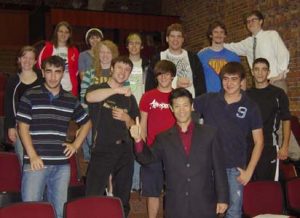
It’s refreshing to see the interest in leadership among many campus life students. It’s an acknowledgement that leadership skills enhance campus life, not only for student leaders, but for the entire campus population.
For those near graduation, there’s also the thought that leadership skills will help land nice jobs and future promotions. Having been a corporate executive manager, I can certainly say that this is quite accurate. But what exactly are leadership skills? How can leadership skills help secure future career opportunities for leadership positions like managers and supervisors?
Once a university invited me to be a keynote speaker at their annual commerce society dinner. Just before my keynote, there was an opportunity for students to network with industry contacts. Strangely, most of the students during this networking hour did not network with any of the industry folks at all. Instead, they just chose to stand around in groups of friends and ignored the industry professionals the entire time.
This was a HUGE missed opportunity for the students to make valuable industry contacts and learn directly from professionals in their prospective careers. My guess is that despite some of these students being leaders on campus, most of them did not really know HOW to network or COMMUNICATE with those other than their own group of friends.
If you remember nothing else from this article, remember this: A huge part of being a leader is how effectively one COMMUNICATES with others
LEADERSHIP requires COMMUNICATION skills.
Too many student leaders spend more time developing their technology (cell phone, computer) skills than developing basic interpersonal communication skills. This will be a problem if they want future leadership positions in their careers. Luckily, communication skills are trainable, although it may take some serious effort to develop communication levels useful to leadership positions.
Effective communication skills can be broken down to three main areas; group presentation skills, one on one conversational skills, and giving effective feedback to others.
COMMUNICATION Skills For Great LEADERSHIP.
Group presentation skills are usually a given, since most people expect this. Experienced leaders are usually very effective when presenting in front of audiences. They must be able to direct, inform and when necessary inspire their teams to action. If you aren’t comfortable speaking in front of your group, you will never be able to pull them together as a team. No one wants to follow someone who can’t give them a clear vision of what they need to accomplish and how to go about it.
Giving effective feedback to others will also be expected since leaders (and for the purpose of future references supervisors/bosses/business owners) often have to give feedback whether to staff members or volunteers. People want o know when they are doing well, and NEED to know when they aren’t. Here’s a great tip.. Praise in public to encourage their future involvement and initiative, but discuss reprimands and corrective paths in private to protect their standing and respect with the team.
Now, what usually surprises people is my inclusion of one on one conversational skills. Top leaders must have the ability to effectively communicate on a one to one basis. This is true whether in a working situation or a social leadership position, such as volunteer leadership. People need to feel like they can connect personally with leaders. They want to know that they are recognized, and even regarded as socially accepted by the people they are leading.
Your conversations and daily interactions with your team may seem insignificant, but will make a huge difference in the loyalty and forthrightness they display. Some of the most memorable and influential moments I have ever experienced have happened during small chance meetings. Try to be genuine in your concern and consistent in your principles.
Unfortunately, these communication skills are usually not taught in most lecture halls, but they represent vital skills if students want to be successful leaders in their future careers. That’s why it is so important for students to develop effective communication skills through a workshop or supplemental course in addition to their college course studies in order to best prepare them for their futures.
Remember, if you want to become a great leader in your future career, become a great communicator with respect to the three main areas outlined.
Clint Cora is a speaker on career development and leadership skills. His live and interactive workshop on communication skills for leadership involves actively using effective techniques during group activities to learn all three main areas identified above. For more information on his live presentations, see my available programs at www.clintcora.com/collegespeaker.html